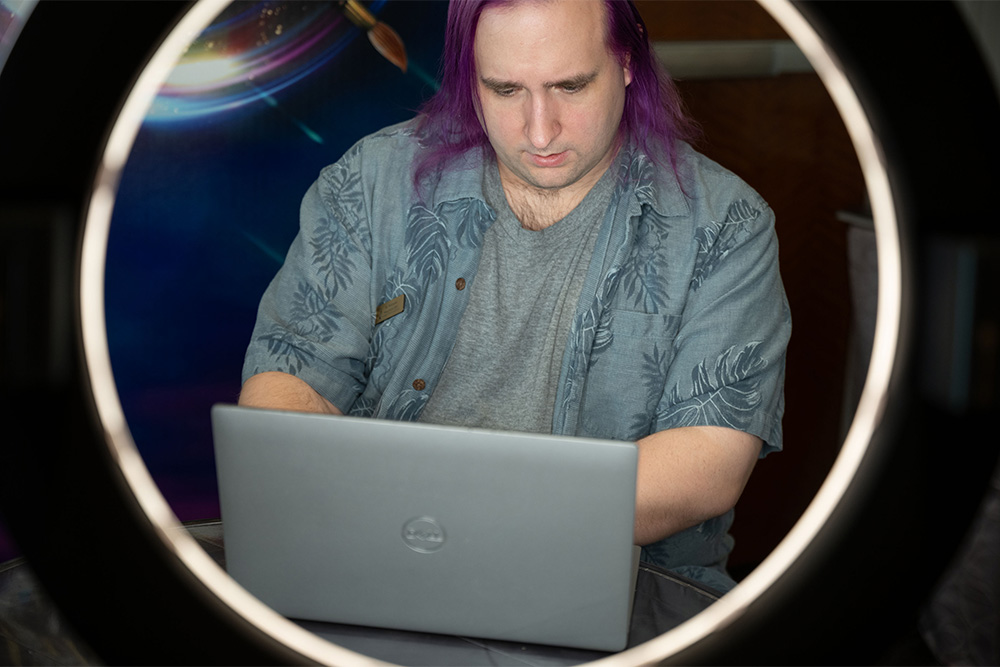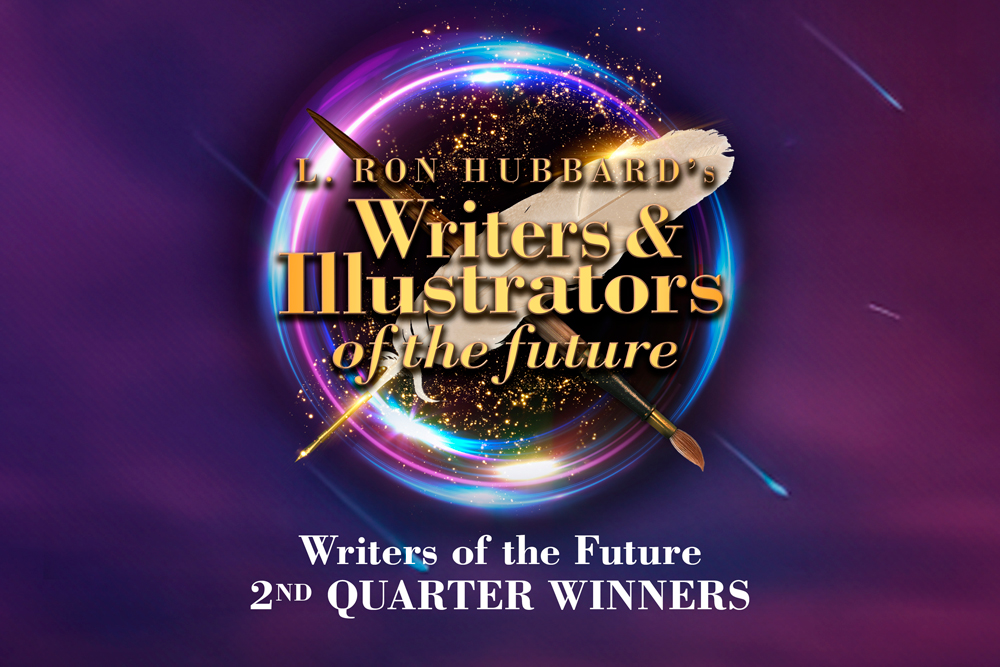Sky McKinnon: Entering, Exiting, Entering Again
My first dirty secret is that my winning story was not originally written for Writers of the Future. Yet I believe that was the key to its success because it was written for the right audience.
Writing to Jody, or the simulacrum of all possible judges on the panel for the quarter, can get you out of the slush pile and maybe even into the finalist circle. For many people, that drive to win is all the fuel they need to get them over the finish line. This contest has been and will continue to be the forge in which many sharpen their skills.
I won’t speak for others, but my obsession was hampering my growth and my ability to craft a good story. I took feedback from the judges, whether it was through Semi-Finalist critiques or sharing their wisdom in interviews and blog posts, and incorporated it all into my toolkit. I was getting better at certain skills, but was I getting better as a writer?
Did it matter?
Of course, it did. Everything matters in some granular way, and while spending years in the artistic doldrums is not the most productive, rest and reflection are just as important as the perpetual grind.
My second dirty secret is that I stopped submitting to any pro market for several years. If you’re someone who’s missed a lot of entries and feels like there’s no chance for you to win in the future, that’s not the case.
Ah, before you protest, I only stopped submitting. I did not stop writing, reading, or thinking about how to write. I invested myself in what my communities were reading and sometimes shared my own stories. I wrote for a variety of friends and strangers. I learned to please the ones who savored technical details, the ones who demanded spectacle, and the ones who enjoyed philosophical explorations. I did my best not to alienate any of them, though no matter your intentions, it is always a risk.
(If you ask someone to give you an honest opinion of your work, be sure you offer the same. And if they’re not the sort to make and share, then don’t underestimate the persuasiveness of buying someone a drink or a pizza).
By thinking about what stories they would enjoy and find engaging, I was stepping beyond “writing” and into conscious “storytelling.” The distinction is that one term only encapsulates a medium and the other your role in the art. I was not getting paid nor getting credits to my name, but the relationship with my readers is why I do this in the first place.
The Winning Story
One story I wrote stood out, not for my admiration of its features, but in the emotional reactions it received from my trusted readers. No one said it was “special” but they did agree that it was emotionally engaging, in a way that was palpably different than their earlier reviews.
The Edge of Where My Light is Cast is not the first time nor the last time I will ponder artificial life. The inspiration for the story is part of a greater conversation with computer scientists, philosophers, and writers as far back as Mary Shelley and beyond.
It is also one of my more optimistic stories. Why is Tabitha created? To serve as a living memory of a companion that was loved and cherished. Not for profit, for fame, or to save the world. It was the strength of her owner’s love and degree of destructive obsession that sparked life in the digital cat.
(I have withdrawn from using phrases like “AI cat” to describe the story. The meaning of the term “artificial intelligence” has faded into a vague gesture towards “something computery” and has otherwise lost meaning in the public’s consciousness.)
What to do with Tabitha once she exists, though? I chose the genre that suited her limitations, and her need for discovery—a mystery, but not one of the criminal underworlds and ascending gods—to reflect how she would come to discover herself. Because she was limited to the information that is stored in electronics, I was forced to learn how she would interact with our world and search for her missing owner.
It culminated in Tabitha and the reader together asking the same impossible question.
“How do you process grief?”
I think there is a lot of pretty language in the story, but the treatment of that question is what made it what it is.
Writing Tips
Writing tips? Oh, goodness, I won’t bore you to death with the minutiae of my process. If you’re reading this in aspiration, I hope someone has given you the classic “read, write, submit” nuggets paraphrased by more traveled authors than myself. Do it. Do it for pleasure. Do it for yourself.
And read poetry, too. There is no better place for the appreciation of language, solemn contemplation, and pure unrestrained glee.
Eat, live, breathe poetry. It will serve you on your best days and at your worst.
“But Writers of the Future doesn’t accept poetry!”
Yes, but poetry makes you a better writer and a better storyteller.
You may notice a refrain here.
My generation received a masterclass in stating the obvious, but there is some value to it. It is called “speculative fiction” because you must speculate. There must be questions, and you must attempt to answer them. They can be deep philosophical questions, like “How would a digital life form experience our world through instruments and code?” Or it may be a more whimsical question, like “What if Corgis could fly?”
Your audience would perk up their ears and nod emphatically. “What IF?” indeed. But now this is the trick you have played on yourself, for you have presented yourself as an authority on flying Corgis and must maintain that relationship until the tale has concluded. Your question has chosen its audience, and now you must see it through.
(And if you are to say that flying Corgis is a solemn subject, then you are now crafting a story for an audience based on that opinion. Good luck!)
Everyone entering the Contest will have their strengths and weaknesses to meditate upon. I would encourage you to use the wealth of resources available on this blog and provided by Writers of the Future, and beyond.
In honor of the “speculative element,” I offer the questions that brought me from Finalist to Winner:
Who are you writing for? What is the story you want to tell? And how will you connect to your audience through those words?
Sky McKinnon is an author and artist grown from the Pacific Coast of Alaska. They hold an MFA in Poetry from the University of Alaska Fairbanks and a Master’s in Library and Information Science from the University of Washington, though their journey with stories began with their mother in the forests of the North.
Sky currently resides in Seattle with friends, both upright and furry varieties, and their beloved partner Jayde, who continues to be a source of endless inspiration and joy.





Thank you for this post, now all I can see are Flying Corgis everywhere :).
I particularly appreciate the speculative questions you posed in the end, I actually wrote them down on my writing notebook.
If you end up writing us another blog post, I would love to hear your answer to them, particularly that last one.
Thank you again, congratulations on the win 🙂
Noor.
Fellow Alaskan here. Great post! And I am now tempted to try to write a serious story about flying Corgis. XD Love the advice about reading poetry and the comments about “the trick you have played on yourself.” Good things to think about. Congratulations on the win!
Thanks Sky. Great advice there. I like your phrase “The meaning of the term “artificial intelligence” has faded into a vague gesture towards “something computery” and has otherwise lost meaning in the public’s consciousness” – supremely well summed up.
Cheers